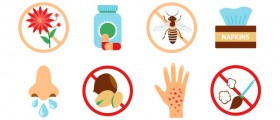
Our body may react differently to different medications. As far as allergic reactions are concerned, these commonly manifest through localized rashes. Nevertheless, even vital organs may be jeopardized by drug allergies. Still, these adverse effects often do not go that far, leaving the skin to be the most commonly affected organ. Even though there have been occurrences of death due to allergic reactions to certain drugs, these situations are extremely rare.
When do Drug Allergies Appear?
Allergic reactions to certain drugs usually do not appear when you take them for the first time. Rather, the unwanted reactions of your body are likely to happen once you take the medications in question for the second time.
Thus, if allergic reactions to certain drugs appear after you have taken the drug in question for the first time ever, there are great chances that you have been exposed to this type of medication earlier, without even knowing it.
It is important to differentiate side-effects of drugs from drug allergies. In fact, only 10% of adverse effects of drugs are actually allergic reactions. Other causes of side-effects are interactions between two or more types of drugs, liver and kidney damage making it impossible to break down the drug properly, overdose and irritation. So, due to many different types of unwanted effects of medications, upon visiting your doctor, it is very important to describe yours precisely and in detail.
Reasons behind Drug Allergies
The main reason behind this reaction of one's body to a certain drug is the immune system, perceiving the drug as something foreign in the body, producing the antibodies which lead to the onset of the adverse reactions. The antibodies, once they notice the repeated presence of the drug in the body, trigger certain mediators, such as histamine, leading to characteristic side-effects.
Speaking of drugs which commonly trigger allergic reactions in people, we need to mention painkillers, non-steroidal anti-inflammatory drugs and Aspirin. Antibiotics, and anti-seizure medications are also the common culprits behind allergies of this type.
Additionally, you are more prone of developing drug allergies if you expose yourself to the drug frequently, take large doses of it, especially in forms of injections, or have a tendency of drug allergies running in your family.
Signs of Drug Allergies
As far as the skin is concerned, drug allergy develops in a form of rashes resembling measles, hives, sensitivity to sunlight or presence of red, raised and itchy parts of the skin looking like targets.
Other signs of drug allergies can be fever, pain in joints or muscles, swollen lymph nodes, kidney inflammation or anaphylaxis. Anaphylaxis, or anaphylactic shock is a condition manifesting through skin problems, breathing difficulties, light-headedness, irregular heartbeats and swellings affecting many different parts of the body.

















Your thoughts on this
Loading...